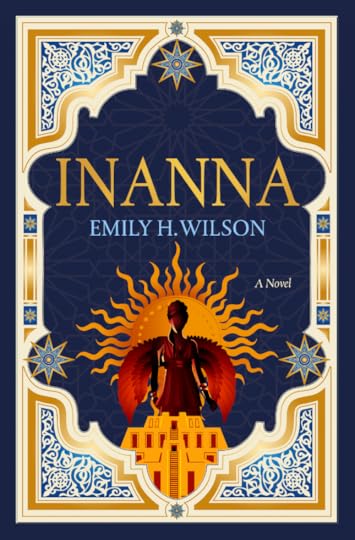Review: Inanna by Emily H. Wilson

Inanna by Emily H. Wilson is a historical fantasy retelling of the Epic of Gilgamesh and the mythology of the ancient Sumerian Gods. To be honest, I have not read the Epic of Gilgamesh and only knew a little bit about ancient Sumer and its gods when I went into this book. That said, perhaps it was better I went in with a clean slate, so to speak, so that I wouldn’t constantly be comparing/contrasting the ancient legends. I was interested to learn about ancient Sumer and the goddess Inanna.
Inanna, the first full-blooded Anunnaki (god) born on earth, is only coming of age in this first book of a trilogy, a mere 13 or 14 when she is sent to live with her high god grandfather and experience his licentious ways, only to be married off to his son–her uncle, who is too busy having an affair with his own sister. While Inanna is a goddess of the ancient world, “the goddess of love” or so everyone tells her, I was still uncomfortable with the situations in which she was placed even if we did not get them in detail. For example, all gods must perform the “sacred rites” in their temples in front of a crowd–those rites being sex with another god or a chosen mortal. Inanna has heard all her short life that she is a goddess of love and must submit. She must be meek and pliable; be what everyone wants her to be. Despite following these parameters, she cannot get her “mee” to work–which is a type of magical weapon bracelet bound to a god. It is not until Inanna begins to really come into her own, find her own power and independence, that she learns her mee is for war, not love. While the reader is supposed to sympathize with Inanna, there are many times I found myself confused at her dialogue or action choices–particularly with her cousin Gilgamesh. The reader is told many times that she is attracted to him despite them not really knowing each other, and a pseudo-forced-feeling romance ensues.
Which brings me to Gilgamesh. I did not find him likeable at all, and he had little redeeming qualities. He’s entitled and cocky, and of course this reader does not think him worthy enough for the goddess Inanna. The only interesting point I found about Gilgamesh’s POV was the will they/won’t they build up to an extremely brief romance with his comrade at arms, Enkidu. However, the ending of their romance is so abrupt you hardly get time to take a breath before the story moves on.
The only character I felt truly relatable and understandable was Ninshubar, a young woman from an African village who is taken from her home and sold as a slave in Sumer. Ninshubar is resourceful, strong, noble, and filled with integrity. She must learn Sumerian swiftly as an attendant in a temple of a Sumerian god. However, Ninshubar’s story soon intertwines with both Inanna and Gilgamesh as Inanna begins to form a plan to overthrow the tyrannical elder gods.
Overall, despite the unique setting, I felt Inanna to be quite rushed. This reader could not always get her bearings before we were rushing off on the next leg of the adventure. I think not knowing the original epic and myths at times put me at a disadvantage in keeping all the gods’ names straight. More often than not, Wilson tells us everything that’s happening rather than showing us. The showing scenes are engaging, but there were too few, resulting in a disconnect from the characters and their motivations. Some of the more interesting scenes involved Inanna’s journey into the underworld in which she must pass through seven gates–gates that seem strangely technologically advanced (the author’s allusion to the Anunnaki actually being aliens rather than gods who “came down from heaven”??) Unfortunately, I did not connect with these characters as much as I’d hoped.



